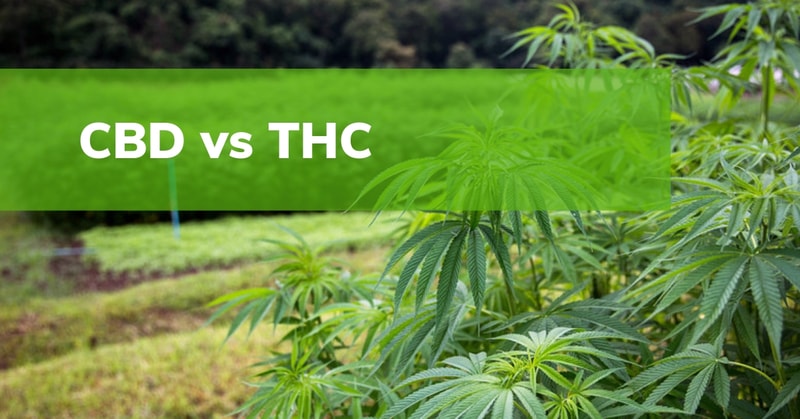Cannabis (a.k.a. marijuana) is a plant that has been used for its healing properties for centuries. However, due to relatively modern prohibitions on the plant, scientific research has been slow to study the various compounds in this herb, also known as cannabinoids.
So far, there have been 113 unique cannabinoids identified in cannabis. Among these, there are two that make up the bulk of most cannabis strains, CBD and THC. This article will take an in-depth and up-close look at these important compounds.
I will answer these important questions in this article:
Tetrahydrocannabinol (THC)
Discovery
THC was first isolated in a laboratory by Israeli researcher Raphael Mechoulam in 1940. After isolating the compound, Machoulam took some home and, along with some friends, took some of it orally after it was baked into a cake, confirming the substance was indeed the compound in cannabis responsible for its high effect when consumed.
Leading the way in cannabis research, Mechoulam and a close-knit team of other researchers would later discover the body’s natural endocannabinoid system which included naturally occurring cannabinoid compounds and receptors found throughout the human body.
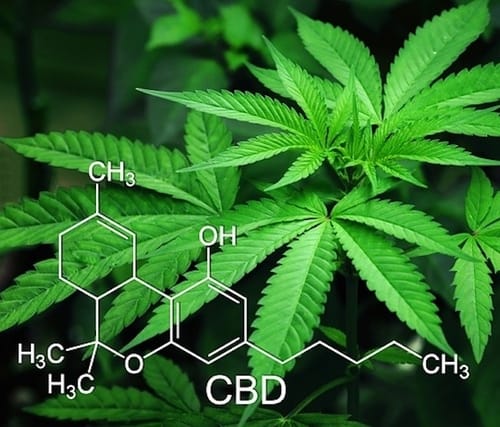
Unfortunately, because of the mind-altering properties of THC, the entire cannabis family has become a target for law enforcement thanks to the Controlled Substance Act of 1970, Nixon era legislation that articulated the guidelines for how the DEA and FDA would define and enforce controlled substances.
Legal Prohibition
Even though THC had already been identified as the mind-altering compound in cannabis, no distinction was made in the original controlled substance definition. Thus all strains of cannabis were made illegal in the United States at the federal level, regardless of the level of THC the plant contained.
This included industrial hemp, or Cannabis Sativa L., which is a cannabis strain that has such a low level of THC that one would have to consume massive amounts to get “high.” This plant has become the subject of recent legislation, as Congress, under pressure from a demanding public, has been trying to lift the prohibition of industrial hemp so that American farmers can legally grow and sell this crop.
Why has public opinion regarding industrial hemp shifted so dramatically in the last decade? In large part because of the growing body of evidence of the health benefits of another important cannabinoid found in cannabis: CBD.
Cannabidiol (CBD)
Discovery and Research
Cannabidiol, also known as CBD, was also isolated by Raphael Mechoulam in 1940.
It is usually the most common cannabinoid found in cannabis plants and has been the subject of a great deal of scientific research.
It is non-psychoactive which means it won’t get users high or affect their ability to concentrate. In fact, it is thought to moderate the psychoactive properties of THC when they are used in combination by actually counteracting THC’s cognitive effects.
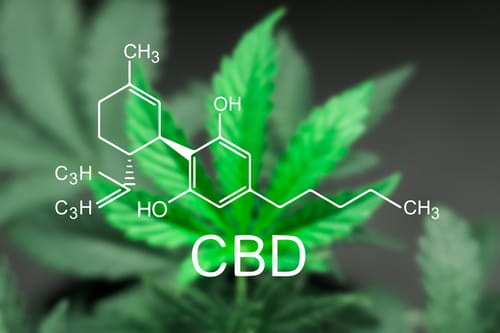
The research on this compound has been extensive and ongoing. For a more complete list of the health benefits of CBD, see our informative article here. In brief, CBD may have important therapeutic benefits that include:
Legal Prohibition
Due to conflicting and confusing federal and state laws surrounding marijuana prohibition, the legal status of CBD and products made with this compound remains in a state of flux.
What Is the Difference Between THC and CBD?
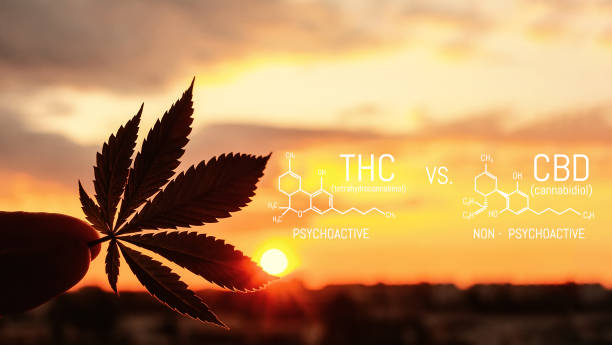
While research into the various effects of cannabinoids continues, one thing is certain, unlike THC, CBD will not get you high. This is perhaps the most important distinction between the two for two reasons.
First, many people want access to CBD for the health benefits without having to deal with being cognitively impaired from the THC found in medical marijuana.
Second, this should matter for regulatory agencies looking to prevent people from getting high since that seems to be the top priority for drug enforcement agencies, even when CBD oil is being used by patients to treat chronic and serious medical conditions such as childhood epilepsy.
This fact has been the subject of recent court cases aimed at removing CBD from the notorious list of controlled substances. However, it will likely take a legislative act to accomplish since the DEA has the authority to change the status of this non-psychoactive natural compound and they seem to be firmly on the side of CBD prohibition.
What Is the Difference Between CBD Oil and THC Oil?
It is important to keep in mind that the rise of CBD related products and the legalization of marijuana (both for medicinal and recreational use) are happening at the same time. Outdated laws governing marijuana are starting to finally fall in the face of growing research about the safety of these substances, and wide-scale changes in public acceptance of marijuana and/or CBD use grows.
This can be confusing for the consumer since both CBD oil and THC oils are available for legal purchase, depending on the state you live in. These products are NOT THE SAME THING. Read on to learn the difference.
CBD Oil
CBD oil is made from industrial hemp, a specific strain of cannabis that is very low in THC.
Products marketed as CBD oil should have less than .3% THC in them (but check my reviews before buying to be sure!).
That means, they will not get you high.
Some CBD oils are made using a CBD isolate. This means that the specific cannabinoid CBD has been isolated from all others found in the plant, producing a pure crystal that is then added to different CBD products.

In other cases, CBD oils are marketed as “full spectrum.” In this case, you can expect a balance of various cannabinoids that replicates the diversity found in whatever specific strain of hemp that the product was derived from. These full spectrum products almost always contain trace amounts of THC in them, although not enough to cause the “high” effect.
There are many people, including experts in cannabis research, that believe that full spectrum CBD oil may have more health benefits because of the complex interaction of the various cannabinoids as they are used by the body and interact with the endocannabinoid system.
This so-called “entourage effect” does have some basis in research which is why full spectrum CBD oil tends to be more expensive than CBD oil made from isolated CBD.
THC Oil
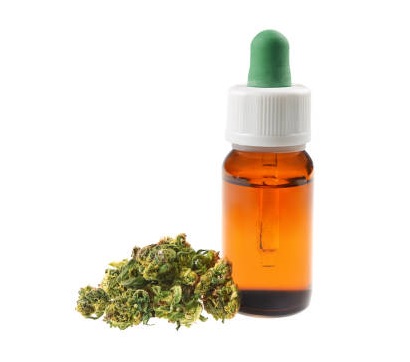
THC oil is also derived by extracting the cannabinoids from the cannabis plant.
However, the key difference is that this oil is derived from strains developed for medicinal or recreational use that are known to have high levels of THC.
As a result, THC oil is very high in THC and will get you high, regardless of if you take it orally, sublingually or if you smoke it in products designed for vaping or dabbing.
However, although THC is highly sought after for recreational use in states that have made that legal, it should not be misunderstood as ONLY having value for recreational users. In fact, THC also has important medicinal uses as discussed above, and some people do use this oil for its important therapeutic effects on a variety of health conditions.
Beyond CBD or THC: Other Cannabinoids of Note
Cannabigerol (CBG)
In the process of growing, cannabis plants produce a great deal of this cannabinoid, however, as the plant matures most of it is converted to other cannabinoids such as THC or CBD. It is sometimes referred to as the “stem cell” cannabinoid as a result.
It is known to bind with both endocannabinoid receptors in the body, and it may have several therapeutic benefits that have yet to be fully discovered by medical research.
Cannabigerol (CBG) research is in a nascent phase that has not yet included significant clinical studies on humans. However, it has been studied in animal subjects to further investigate its potential effect as a therapy for neurodegeneration, colitis, cancer, psoriasis and digestive disorders among others.
Cannabichromene (CBC)
Unlike other cannabinoids as we understand them (so far), CBC appears to bond with receptors outside of the body’s endocannabinoid system.
In addition, it seems to have a synergistic effect when consumed in coordination with THC, increasing its powerful anti-inflammatory, anti-viral, anti-fungal and antibiotic qualities. It may also have both antidepressant and neurogenesis effects.
More research needs to be done to fully determine how this cannabinoid is reacting with the body’s natural nervous and immune systems. In addition, fully understanding its synergistic effect on other cannabinoids will be a major area of future research.
Cannabinol (CBN)
This cannabinoid appears in cannabis as the THC found in the plant begins to degrade from light and exposure to oxygen over time. It is one of the few cannabinoids that does not come from CBG, the “stem cell” of most cannabinoids found in cannabis.
It is thought to have a strong sedative effect, with potential future applications to replace or augment more addictive sedatives currently being prescribed. It may also play a role in regulating appetite and reducing cancer tumor growth rates.
CBD, THC and The Endocannabinoid System
Both CBD and THC are compounds that interact with the body’s endocannabinoid system. It turns out that the body produces its own cannabinoid analogs designed to trigger receptors in the brain and body that control a wide variety of processes. To date, two main receptors in the endocannabinoid system have been identified.
Cannabinoid Receptor Type 1 (CB1)
Concentrated in the brain, spinal cord, and central nervous system, these receptors are responsible for regulating a wide variety of body functions including appetite, memory, sleep, neuroprotection, digestion, reproduction, emotion and pain.
Cannabinoid Receptor Type 2 (CB2)
Found largely in the peripheral nervous system, these receptors play a vital role in regulating inflammation and other immune system functions.
THC vs. CBD: Different Modes of Action
Although both THC and CBD interact with the endocannabinoid system, THC does so more directly than CBD. In fact, THC can bind directly to both types of receptors, although the effects produced can vary from person to person. This explains why people have different reactions to the effects of THC regarding its mind-altering action.
On the other hand, CBD reacts indirectly by inhibiting the FAAH enzyme in the body. This enzyme breaks down the most important natural cannabinoid produced by the body itself, known as anandamide.
Anandamide plays an important role in mood. By inhibiting the action of FAAH to break down anandamide, CBD acts to increase levels of this important mood-boosting compound in the brain. This may be why some people find that CBD is helpful for depression and anxiety.
Cannabinoid Research
It is important to take note that research into the exact ways in which the different cannabinoids act in tandem with the endocannabinoid system of the body has been severely hampered by prohibition laws that have made research into cannabis exceedingly difficult.
Luckily, public awareness of this disastrous situation is on the rise, and outdated laws that have constrained research are falling to the way side and pharmaceutical companies such as GW Pharmaceuticals are now leading the way in medical cannabis research.
As a result, stocks for private companies racing to develop drugs to reap the health benefits of various cannabinoids are on the rise, fueling a new wave of treatments on the horizon. (See our story on Epidiolex® for more on this trend.)
Want to Learn More about CBD and THC?
I am dedicated to helping to inform people about the various health benefits of CBD, its changing legal status, and where to find the best CBD products from reliable manufacturers. If you want to stay in the loop, consider following my page on Facebook for updates.
If you found this article helpful, or want to add something that you think would help my readers, please feel free to leave a comment below. Let’s get a conversation going about the difference between CBD vs. THC that can help folks understand these two key cannabinoids found in cannabis.
